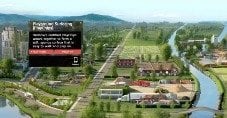How to Choose a Playground Wood Chip Provider
The surface you choose for your playground will affect the safety, accessibility, and the amount of maintenance it requires. Playground wood chips, commonly known as engineered wood fiber is one of the most popular options. However, not all wood chips are created equal.
Why Regular Wood Chips Don't Cut It
Regular wood chips or bark mulch are great for many things, but they aren't the best choice for your playground. First you have the risk of splinters. Many times wood chips are made from wood that is being recycled, so the wood chips may be treated with chemicals that you don't want little ones coming into contact with. They also are more prone to mold. Regular wood chips aren't standardized or held to any specific regulations, so it is harder to be sure exactly what you are getting. The biggest difference, however, has to do with the amount of cushioning they provide. Regular wood chips or mulch don't provide enough cushioning to be considered a safe playground surface. If a playground surface isn't up to the proper specifications, you may be liable if a child gets injured in a fall. They simply aren't worth the risk.
What Is Different About Playground Wood Chips
Playground wood chips, also known as engineered wood fiber, are designed specifically for playgrounds. They have several distinct advantages over regular wood chips/mulch. Playground chips are made from untreated wood, so they are completely free of hazardous chemicals. They are also made to certain size specifications. They are usually smaller than two inches, and they don't contain any twigs or leaves.
The material doesn't decompose as fast as mulch, but it does become compacted. This is partly due to the design of the material. It is designed to knit together to provide superior cushioning. Raking can prevent it from becoming too compacted. Raking will also remove any glass or other dangerous debris, because it tends to stay on top of the engineered wood fiber.
It provides a more cushioned landing than pea gravel. The other advantage is that pea gravel may be tempting for animals to use as a litter box, and they are able to bury their leavings in the gravel. The way the wood chips knit together discourages this, and any debris is sure to remain on top so that it can be easily disposed of.
Playground chips are considered an attenuated surface. This means that as long as the depth requirements are met, it provides a safe amount of cushioning in the event a child falls.
Another safety advantage is that it doesn't attract insects. Insects and termites are attracted to some wood products, but playground chips tend to be too small for them to be interested in. The material is also wheelchair accessible. You will need the playground chips to be a minimum of nine inches thick for fall attenuation. However, the recommended depth to break falls from up to 12 feet high is to install the initial playground chips to a depth of 12 inches after compaction (allow for 30%). You may need to add a new layer about once a year to ensure that you maintain the depth.
Importance of Maintaining a Proper Surface
The safety of the children playing on your playground depends on the surface you choose to use. Proper playground chips will help protect children from falls, from potential hazards that could become hidden, and splinters. It is your responsibility to make sure kids are safe on your playground, and that it is properly maintained. If an injury does occur, a playground inspector will come to see if your playground meets the proper safety standards. If it doesn't, you could be held legally responsible for any injuries.
Converting From Pea Gravel to Play Chips
If your playground is currently surfaced with pea gravel or other material, you can convert your playground to play chips in just one day. First the pea gravel is removed. Then the play chips are blown into the playground. This allows the chips to knit together creating the best play surface and minimizing settling.
How to Know If a Manufacturer Meets The Proper Standards
The manufacturer you choose to purchase from should provide you with International Play Equipment Manufacturers Association certification. Specifically, the playground wood chips should pass tests for impact, accessibility, purity, and flammability. Your manufacturer should be able to provide you with a copy of these test results.
It is also important to choose a company who has a proven track record for providing quality materials and proper installation.
It is a real joy to watch children enjoy playing on a playground. Use playground wood chips with the proper certifications, and you can rest assured knowing they are safe while they are playing.

